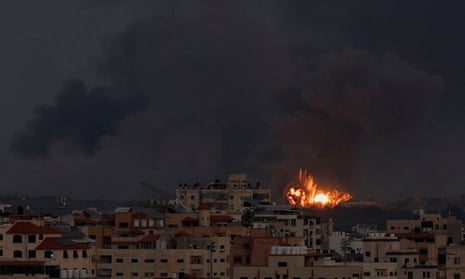Frightened residents of Gaza have described bombardments striking residential buildings, hospitals and schools across the enclave amid growing concern over destruction of civilian infrastructure as Israel pledges to enforce a full siege.
Palestinian health officials said more than 900 people have been killed, with 4,250 wounded since Saturday.
Nidal Hamdouna, a humanitarian worker with Norwegian-Danish organisation Church Aid, said: “I believe this is the most serious escalation I will face. I was born here in Gaza, I witnessed the previous escalations.
“The situation we are facing involves intensive airstrikes and shelling targeting different locations across the Gaza Strip, including my neighbourhood,” he said, speaking from the northern edge of Gaza City. “The issue is that there is no safe place to go to in Gaza right now.”
“I witnessed the wars of 2008, 2014 and 2021, but this is something unique in terms of the intensity … entire families have been killed. The concern is to what extent civilians are protected, but also how to find a safe place, even though there is no safe place to go to.”
Gaza’s sole border crossing with Egypt, the only entry point not controlled by Israel, was hit by an Israeli airstrike on Tuesday for the third time in 24 hours, an Egyptian NGO said.
The UN office for the coordination of humanitarian affairs (OCHA) has said that more than 200,000 people have been displaced in Gaza, with that number expected to rise. Airstrikes levelled 790 housing units, it said, and severely damaged 5,330.
The rising number of wounded risks overwhelming what remains of Gaza’s fragile healthcare system after a 16-year blockade from the Israeli authorities curtailing inflows of people, fuel, construction materials and food.
Mahmoud Shalabi of the aid organisation Medical Aid for Palestinians said: “Beit Hanoun hospital in the north of Gaza has been out of service due to the collateral damage it received from bombardments around it. Also, roads around it were destroyed so now it’s not possible to access it.”
Shalabi also described damage to Gaza’s largest hospital, Al Shifa in Gaza city, which has long acted as the central point of care for the enclave’s residents, particularly during moments of crisis.
“The neonatal unit at Shifa hospital, the central trauma hospital and the largest in Gaza, was partly damaged due to bombardments around the facility,” he said.
“The roads around Al Shifa have been severely impacted, which is limiting movement to it, while all hospitals are suffering greatly from the lack of supplies and personnel,” he said. “Yesterday, the ministry of health called for all nurses in Gaza to begin volunteer work in the nearest hospital.”
UN secretary general António Guterres expressed his concern at increasing reports that Israeli airstrikes and shelling had hit civilian infrastructure. “While I recognise Israel’s legitimate security concerns, I also remind Israel that military operations must be conducted in strict accordance with international humanitarian law,” he said.
“Civilians must be respected and protected at all times. Civilian infrastructure must never be a target.”
Guterres previously said he was “deeply distressed” by Israeli pledges to enforce a “complete siege” of Gaza. Earlier this week, Israeli defence minister Yoav Gallant said that “no electricity, no food, no water, no fuel” would be allowed to enter the densely populated territory after an unprecedented incursion by Hamas militants into Israel, leaving more than 1,000 dead – the greatest loss of life from a militant attack in Israel’s history.
Fighters from Hamas and the Palestinian Islamic Jihad also took at least 130 Israelis hostage, with a Hamas spokesperson declaring that the group would begin killing captives if the Israeli military struck civilian homes in Gaza “without prior warning”.
IDF spokesperson Lt Col Richard Hecht advised Palestinians to “get out” and escape the airstrikes through the southern border crossing with Egypt, before his office issued a clarifying statement that the crossing is now closed.
“This time it really is a catastrophe for the entire Gaza population – more than 2 million people are under fire and affected by this war and the escalation because of a full siege,” said Hamdouna, predicting a sharp rise in the number of internally displaced people, despite a lack of shelter.
“There is real concern about the availability of water. I have water for one day, maximum – I don’t know if I can get more. I don’t know about the availability of food. But there are also restrictions on movement, whether I can safely get to the supermarket, to what extent trucks can reach my home to carry drinking water. All these things made the situation far worse, in addition to these intensive airstrikes targeting everything,” he said.
“I believe this is a collective punishment for the entire Gaza population. Civilians are not safe, they can’t access to their basic needs – water, food. The health sector is deteriorating under the number of injured people,” he said.
“Every aspect of our lives has been affected. Electricity is a major concern, we have at most three hours per day now and the electricity plant in Gaza announced that in a few days it will have no power at all. This will impact access to sanitation, but also food security, in addition to more problems with communications.”
He added: “I can’t even open my laptop to take notes – I’m trying to conserve electricity at home to charge my phone. As a humanitarian worker I can’t even work from my home in response to the crisis.”
The Israeli military said that it had called up 300,000 reservists and begun installing what a spokesperson described as “an iron wall” of tanks and helicopters around the Gaza border ahead of an expected large-scale ground invasion of the besieged enclave.
“It is terrifying,” said Hamdouna. “The concern is what comes next – a further catastrophe in the coming few days.”
